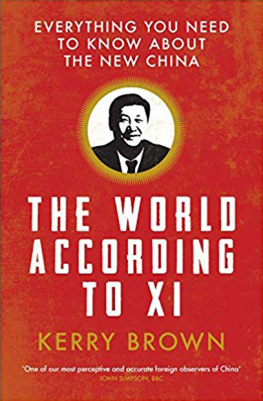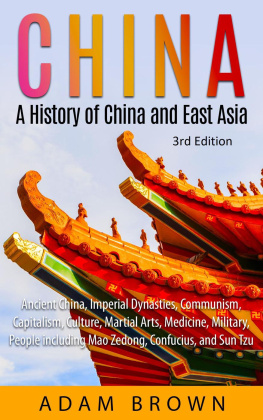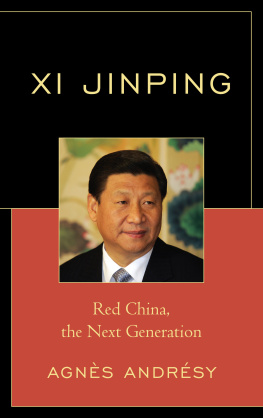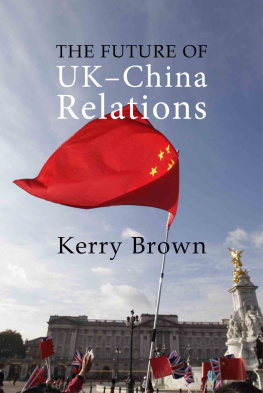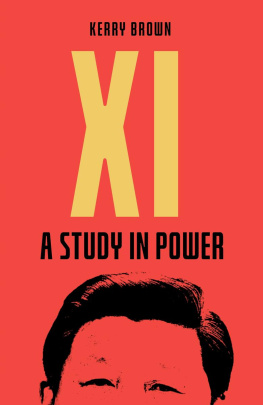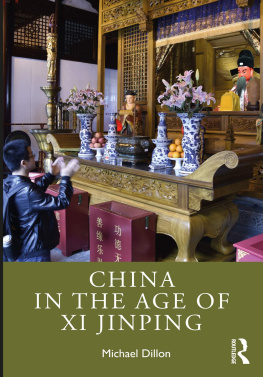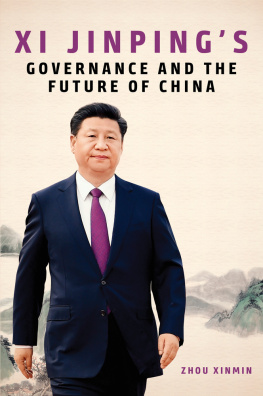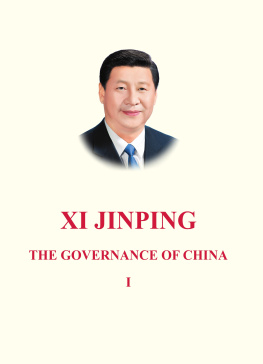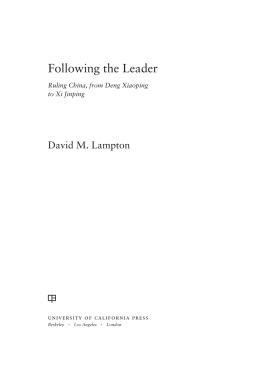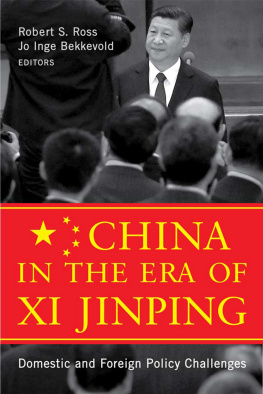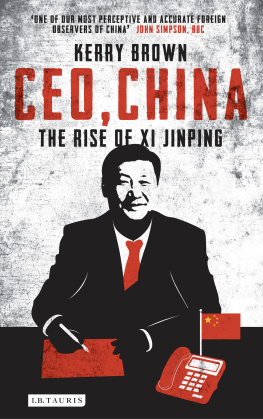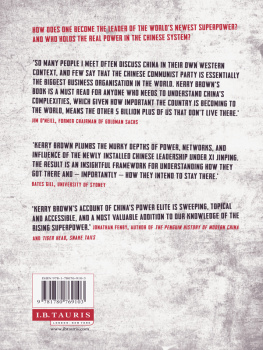KERRY BROWN is Professor of Chinese Studies and Director of the Lau China Institute at Kings College London, and Associate on the Asia Programme at Chatham House. Prior to this he was Professor of Chinese Politics and Director of the China Studies Centre at the University of Sydney. With 25 years experience of China, he has worked in education, business and government, including a term as First Secretary at the British Embassy in Beijing. He has written on China for the London Review of Books, The Diplomat and Foreign Policy, as well as for many international and Chinese media outlets. He is the bestselling author of The New Emperors: Power and the Princelings in China (2014), CEO, China: The Rise of Xi Jinping (2016) and Chinas World: What Does China Want? (2017), all published by I.B.Tauris. His other books include Contemporary China (2013), Friends and Enemies: The Past, Present and Future of the Communist Party of China (2009) and Struggling Giant: China in the 21st Century (2007).
Praise for Kerry Browns
CEO, CHINA: THE RISE OF XI JINPING
an Economist and Financial Times Book of the Year
Xi Jinping, president of China, is now undoubtedly one of the most powerful men in the world. This is the first biography of Xi in English and provides a lucid and readable account of his background, rise to power and political programme.
Gideon Rachman, Financial Times
A crisp and provocative account
The Economist
Brown provides much useful information and analysis based on his deep knowledge; with fresh analysis of Xis friends and foes, this is the best and most accessible primer to date on the leader of the born-again superpower A valuable book.
Jonathan Fenby, Times Literary Supplement
The best book I ever have read on the exercise of power in contemporary China
Prof. Tyler Cowen,
Holbert C. Harris Chair of Economics, George Mason University
An excellent account of Xis rise, his visions, his determination, and the future he is making for China and for the world. All who are interested in China and its global role should read it.
Yongnian Zheng, Director of the East Asian Institute,
National University of Singapore
CEO, China is a thoughtful and thought-provoking study of Chinas current leader A fascinating glimpse into the workings of the Chinese leadership.
Frank Ching, First Bureau Chief in Beijing
for the Wall Street Journal and author of Ancestors

To Rana Mitter, with admiration and thanks.
CONTENTS
First of all, I would like to thank Tomasz Hoskins and his colleagues at I.B.Tauris for their continuing support.
This book would not be what it is without those responsible for the nuts and bolts in its journey to publication, and for this I am very grateful to Sarah Terry for her careful copy-editing and attention to detail, Alex Billington at Tetragon for the high-quality typesetting and production, and Alex Middleton for the proofreading.
On 18 October 2017, Xi Jinping stood up in the Great Hall of the People in Beijing as Party secretary of the Communist Party of China to deliver the political report on behalf of the Central Committee to the delegates of the 19th Party Congress. The hall was full. On his left and right sat Jiang Zemin and Hu Jintao, the former holders of the position he now fills.
His speech lasted 3 hours and 23 minutes. This was a mammoth oration, even for a country which doesnt pressure its high-level officials to watch the clock while speaking. His address referred to the great mission his nation had embarked on: to be rejuvenated, to be a major power perhaps the major power of the modern era. It was in many ways a fitting commemoration of the countrys remarkable resurrection, a country which, within living memory, had experienced famine, international and civil war, revolution and endless political power struggles and distractions. Finally, the promise given by the founding leader of the Communist Party in 1949 when the Peoples Republic had been founded to have Chinas dignity restored to it after a century of victimisation and bullying by others and allow the Chinese people to stand tall was coming to pass. And it would be under Xis watch that this promise would come to fruition.
The consensus from around the world on this congress was that it had finally consolidated Xis power. He was master now of all he surveyed. Since his appointment in 2012, he had come to dominate the Party via its anti-corruption struggle and a series of personnel moves he had spearheaded. But his reach seemed far beyond this. His visits abroad to 50 countries during his period in power have demonstrated that he is speaking not just to China, but to the whole world. In October 2017, during congress proceedings, The Economist magazines front cover carried the simple image of Xi with the statement The Worlds Most Powerful Man.
Xis power has become a widespread obsession. Former US president Barack Obama blithely stated that Xi had consolidated power faster and more comprehensively than probably anybody since Deng Xiaoping. Others were keen to join in the praise, some even saying that he was only equalled by Mao. One commentator in Beijing outdid even this, telling me shortly before the congress that Xis powers and ambitions transcend even those of the founding father, stating simply that Xi wants to rule the world.
This seems hyperbolic. As outsiders, it is interesting to note the way we like to relate Chinese leaders so closely to power. Our assessment of democratic leaders, on the other hand, is more nuanced: they have power, too, but only to a certain extent. There are limitations to what they can do, and their influence naturally ebbs and flows. The mighty today can be toppled after some mishap, as David Cameron found out in 2016 when, after having won the British election the year before, he was sidelined as a result of the Brexit referendum going against his expectations, and then simply removed from power, in the space of a few weeks.
In China we speak about Chinese leaders having a form of Chinese power. They dont hold elections. Their power looks purer and stronger. But anyone with even the most cursory knowledge of Chinese modern history since 1949 would know that Xis China and that of Deng or Mao were very different places. Mao Zedong, leading a marginalised and divided guerrilla force, became ruler of the worlds third-largest country in terms of territory, and was instrumental in campaigns and acts of war for two decades. He was present, with about a dozen other people, at the first ever congress in 1921. Maos rise was on the back of violence, bloodshed and strife, in a society decimated by civil and international war. From 1949 until 1976, despite many ups and downs, he maintained his political dominance, never seriously threatened by any contender simply because of his status as the victor of the battles of the past. Deng Xiaoping had a different suite of attributes, but his impact might be judged by historians to have been even greater. Taking control of a China brought to its knees by Maos economic illiteracy and love of class struggle and mass campaigns, Deng miraculously turned the whole country around, adopting ideas like foreign capital investment, a domestic market and entrepreneurialism, all of which had been anathema under Mao. His influence was never through formal positions of power, however. After 1978, for instance, he was never president, nor Party secretary, although he maintained leadership of the military until 1989. He simply had the political capital and credibility to make sure others followed his lead. Even well into his eighties, when his sole position was chair of the Chinese Contract Bridge Association, he was able to influence events.

